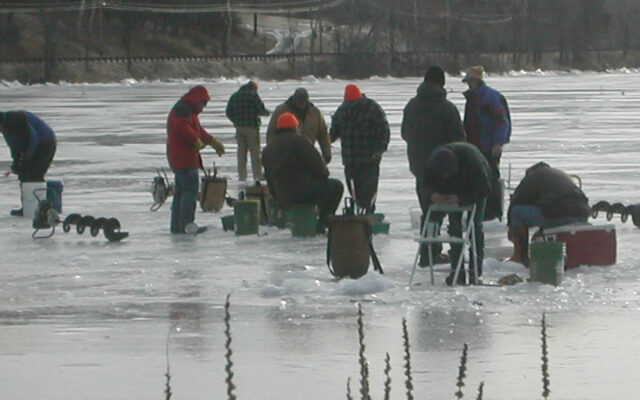
Climate change is taxing Maine’s winter recreation
By Julie Harris, Bangor Daily News Staff
It’s not your imagination. It’s getting more difficult to find enough winter in Maine for traditional activities like snowmobiling and ice fishing.
Longtime ice fishermen, snowmobilers, skiers, skaters and others who rely on winters to be cold and snowy are feeling the strain of a warming Maine.
People from other states who traditionally come to Maine for snowmobiling and ice fishing trips are moving up their normal dates or relocating their vacations to new parts of the state, hoping to catch some winter. Some are canceling their visits, leaving vacancies at lodges that normally are booked solid.
The Piscataquis Radar Runs snowmobile races were canceled because of the lack of snow and a forecast for warm temperatures for the March 2 race date.
The $3.3 billion winter recreation industry is facing some daunting challenges as Maine continues its warming trend. But it doesn’t have to be all negative, according to the groups that are studying the effects of climate change in Maine. It may be that Mainers need to expand how they define winter activities.
A group of experts trying to improve the environment and help Mainers adjust to new weather norms associated with climate change gave a presentation in a ClimateWork Maine webinar on where Maine stands and how to position the state for the future.
The warmer and shorter winter and lack of snow are a result of growing carbon dioxide levels, said Elizabeth Burakowski, climate scientist at the University of New Hampshire. Those levels were 320 parts per million in 1960 and 420 ppm in 2023, she said. Carbon dioxide emissions are slowing and she hoped that by 2025, the numbers will be declining.
Maine was the 10th state to create an Office of Outdoor Recreation to look at its role in the state’s economy, said Carolann Ouellette, the division’s director. Maine needs to learn how to use its assets to grow the recreational economy, and to monitor trends and issues in the state, she said.
The Office of Outdoor Recreation found that recreation made up 3.9 percent of Maine’s economy in 2022, ranking it sixth among all of the states. Manufacturing of outdoor gear and equipment contributed $271 million and retail $850 million to the economy. Approximately 32,000 people work in the outdoor industry. Boating and fishing contributed $412 million and RVing another $326 million. Snow activities including skiing, snowboarding and snowmobiling contributed $68 million, which was a 35 percent increase over 2021.
There were 3.5 million visitors in 2022, and nearly 4 million in 2023. One of the fastest growing areas is outfitter and guided recreation, Ouellette said.
Hiking and backpacking are the top winter activities, followed by snowmobiling, parks, alpine skiing, snowshoeing, fishing, camping and going to the beach, she said.
Innovations such as electric snowmobiles and ice augers and interchangeable batteries between recreational vehicles will help reduce the carbon footprint, she said.
Shay Bellas, CEO and founder of NaviTour, started her business to bridge the gap between those who seek experiences and those who can provide them. She employs 170 guides who offer experiences from hunting to star gazing. The guides, who are outside every day, see the shifting between seasons as they work with clients and can adjust accordingly, she said.
“The guides are at the forefront of building a climate resilient economy in Maine,” she said.
Ski areas like Saddleback are constructing energy efficient buildings and offering EV charging stations as part of their investment in a future that might retain ice and snow as part of the landscape, said Andy Shepard, retired CEO of Saddleback Mountain Ski Area and panel moderator.
Knowledge of problems and potential solutions, innovation regarding how people take part in traditional activities and adding new sports to winter such as trail racing and mountain biking and marketing all that the state can offer is a good approach to sustaining and growing winter recreation, said Jenny Kordick, executive director of Maine Outdoor Brands.
“We need to let consumers know where they can find winter,” she said.
Social media sites have exploded this season with ice reports and safety concerns. At least three snowmobile clubs that normally stake out trails on lakes decided this year not to do it because of the unreliability of the ice.
One of those usually has the trail marked across Moosehead Lake by now. But Blue Ridge Riders snowmobile club has been postponing a decision, which it finally made on Feb. 23. The final straw was the development of pressure ridges of ice that were causing areas of open water on the lake.
“Unfortunately, the decision has been made NOT to stake the lake this year. There are many parts of the lake that are safe, however, there are other obstacles we face when taking on this responsibility,” the club posted on social media. “We know this is not ideal, but your safety is truly the most important. If you know the lake, there are places that are safe to cross, but please exercise caution.”
On Feb. 23, Moosehead had a pressure ridge of ice building from Deer Island to Birch Island and another north of The Birches Resort, both with open water, according to Rockwood Fire Chief Del Hume.
He said he expects ice-out to be earlier than usual this year. The earliest ice-out in the past 20 years was on April 15 in 2010. Last year, it was April 25, but generally it is from late April to early May.
And the ice on Maine’s lakes and ponds isn’t the only concern. Snowmobile clubs in some areas are having to work harder to make their trails usable, balancing a multi-million-dollar industry with the need to preserve relationships with landowners by not damaging their property.
The problems are real in Maine’s winter tourism and recreation industry, but groups like those that took part in the panel could be part of the solutions.